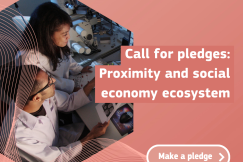Best practices
09 June 2025
Scotland’s Circular Solution: The Reuse Consortium
Best practices
09 June 2025
Partnerships
Regenerative Green Transition
Proximity and social economy
+18 more
-
20

The Reuse Consortium, hosted by Circular Communities Scotland, empowers public bodies to make a tangible difference in local communities and the environment through reuse procurement. From saving carbon emissions to creating jobs, this initiative demonstrates how simple shifts in buying behaviour can spark systemic change.
Topics
Albania
Armenia
Austria
Belgium
Bosnia and Herzegovina
Bulgaria
Croatia
Cyprus
Czechia
Denmark
Estonia
EU-27
Finland
France
Georgia
Germany
Greece
Hungary
Iceland
Ireland
Italy
Kosovo
Latvia
Liechtenstein
Lithuania
Luxembourg
Malta
Moldova
Montenegro
Netherlands
North Macedonia
Norway
Poland
Portugal
Romania
Serbia
Slovakia
Slovenia
Spain
Sweden
Switzerland
Türkiye
Ukraine
Local Authorities
National authorities
Regional Authorities
-
Thematic area
-
-
Partnerships
-
Regenerative Green Transition
-
-
Interlinkages with other sectors
-
-
Proximity and social economy
-
-
Action areas and keywords
-
-
Buy social
-
Circular Economy
-
Clusters (including Cluster of social and ecological innovation)
-
Future workplaces
-
Innovation
-
Innovation as enabler for green transition and business development in the social economy
-
Internationalisation
-
Local Green Deals, green business communities and citizens’ initiatives
-
Local Markets
-
New business models
-
New business models – the platform economy
-
Responsible (Public) Procurement
-
-
Ecosystem focus
-
-
Proximity economy
-
Social economy
-
-
Scope of activity
-
-
International
-
Local/neighbourhood
-
National
-
Regional
-
Share
Changing Procurement for Good
"Using re-use items allows us to play our part in the council’s wider commitment to reducing our carbon footprint, preventing good working items being taken to landfill." – Fife Council
Traditional public procurement processes are often time-consuming, costly, and environmentally unsustainable. With growing pressure on local budgets and increasing concern over climate targets, Scottish councils and housing associations needed a better way to furnish homes, help low-income households, and support their local economies.
Who They Are and What They Do
The Reuse Consortium is a network of Scottish social enterprises that offer high-quality reused furniture and white goods to public sector organisations. Supported by Circular Communities Scotland, the Consortium enables Housing Associations, Local Authorities, and public bodies to buy directly from certified reuse providers without needing to go through lengthy tendering processes. All products meet strict safety and quality standards and are compliant with the Scotland Excel Domestic Furniture Framework Contract.
Why Business as Usual Wasn’t Working
Public sector procurement often prioritised new goods over reused ones, even when second-hand items were equally functional and more affordable. This contributed to unnecessary carbon emissions, overburdened landfills, and missed opportunities for community investment. Additionally, the administrative burden of procurement discouraged innovation and social value integration.
Making Reuse Mainstream
The Reuse Consortium solves these challenges by offering a ready-made, quality-assured route to purchase reused items. The strategy is simple: make reuse the easiest, most cost-effective choice. Through the framework contract, public bodies can access standardised pricing and ordering systems, without having to negotiate individual quotes or conduct new procurement exercises. This means more households helped, more value for money, and more support for the social economy.
Real Change You Can Measure
Since 2016, the Consortium has:
- Diverted over 1.2 million kg of furniture from landfill
- Saved over 3,298 tonnes of CO₂ emissions
- Provided over 28,000 furniture items
- Supported over 13,000 low-income households
- Enabled public bodies to save around £343,000 in 2022/2023 alone
Every reused sofa, for example, saves 40kg from landfill and around 88kg of CO₂ – six times more than recycling. The social return is also powerful: one washing machine purchase can generate £100 for a local social enterprise, funding four hours of training and job support.
What They Learned on the Way
A key obstacle was the stigma surrounding reused goods. Many assumed second-hand meant poor quality. The Consortium tackled this by ensuring all products were thoroughly cleaned, repaired, and certified through the Revolve Standard or Approved Reuse Centre Certification. Sharing testimonials and real-life stories from beneficiaries and councils helped build confidence and shift mindsets.
Another challenge was aligning procurement procedures with social goals. By working within existing framework contracts and proving cost savings, the Consortium successfully integrated sustainability and social impact into mainstream processes.
What Comes Next
The Reuse Consortium is not only here to stay – it is expanding. The vision is clear: every Scottish Local Authority and Housing Association integrating reuse into their procurement strategy. With measurable environmental gains, economic savings, and transformative social impact, the Reuse Consortium is a powerful example of how the circular economy can thrive in public service delivery.
If every local authority in Scotland bought just 100 reused sofas and 100 reused washing machines, it would save as much CO₂ as taking 250 cars off the road for a year – and pay for 10 full-time community jobs.
This is reuse with purpose. This is social procurement done right.
Comments (0)
See also
Abacus: Education and Culture as Drivers of Social Change
- Categories
- Partnerships Regenerative Green Transition Skills +30 more
Financing the Ecosystem Recap: December – January
- Categories
- Partnerships Regenerative Green Transition Skills +68 more
Progress report of the proximity and social economy Transition Pathway: Key insights
- Categories
- Regenerative Green Transition Skills Transformative Digital Transition +59 more




